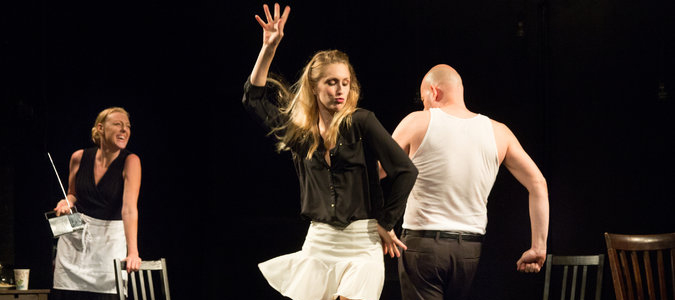

Bastards of Strindberg
Opening Night: September 6, 2014
Closing: September 21, 2014
Theater: Theatre Row Complex
A world-premier of four new short plays inspired by August Strindberg’s iconic Miss Julie, written by four of the most exciting contemporary American and Swedish playwrights.
BUY TICKETSREAD THE REVIEWS:
September 6, 2014
Four contemporary playwrights take on August Strindberg’s Miss Julie in Scandinavian American Theater Company’s Bastards of Strindberg. The four short plays reimagine the tale of aristocratic Julie, who engages in a power play with servant Jean while his girlfriend Kristin dozes off nearby. Strindberg is notorious for his misogyny and these short plays address it by giving most of the power to the various incarnations of Julie and Kristin. The result is often fairly heavy-handed with over-explanatory dialogue, though one of the plays fulfills the promise of the concept. Three of the short plays are frequently self referential with characters stepping in and out of the narrative to provide commentary. While there is some variation in how each playwright approaches this concept, it grows tiresome toward the end. The third short play, Dominique Morisseau’s High Powered, goes for a more conventional narrative but also presents the most intriguing adaptation of Strindberg’s work. Darrin (Kwasi Osei), standing in for Jean, is Julie’s black driver who uses his connection to get a job at her father’s company. He lives in the Bronx with his girlfriend Mya (Zenzele Cooper), standing in for Kristin, who is Julie’s dog walker. The two engage in their own power play as they pack up Julie’s Manhattan apartment and find themselves at odds about Darrin’s career shift.
READ THE REVIEWSeptember 5, 2014
One can imagine August Strindberg, founding father of Naturalism in the European theater, squirming in his century-old grave as Ingrid Kullberg-Bendz begins an evening of Miss Julie-inspired shorts addressing the audience as a matured iteration of Strindberg’s most talked about titular character: “I once told a friend about things I’d done one midsummer night many years ago. And he wrote a play about it. His play was considered ‘naturalistic.’ At least to anyone it wasn’t based on.” But maybe he’s not squirming. What is most successful about Bastards of Strindberg, the Scandinavian American Theater Company’s final production of it’s 5th anniversary season, is the way it embraces and extends the spirit of Strindberg’s work. In the preface to Miss Julie, Strindberg encourages intimacy and a move away from outdated formalism. The four plays featured in SATC’s production react to Strindberg’s work with a similar attitude. The evening of plays was commissioned by SATC in 2012, commemorating the 100th anniversary of Strindberg’s death, asking two American playwrights (David Bar Katz & Dominique Morisseau) and two Swedish playwrights (Lina Ekdahl & Andreas Boonstra) to write a short play responding to Miss Julie. Henning Hegland and Alicia Dhyana House’s direction connects the four pieces within the frame of the Midsummer Eve’s celebration, with varying degrees of success.
READ THE REVIEWSeptember 5, 2014
Anything can happen on a midsummer’s night. Shakespeare knew it, of course, and used the occasion to launch a timeless comedy. August Strindberg knew it as well, but his take on midsummer madness was far darker, a battle-to-the-death play rife with lust and issues of gender, class, and power called Miss Julie. Now we have Bastards of Strindberg, a compelling quartet of short plays produced by the Scandinavian American Theater Company that riff off Strindberg’s themes and bring a contemporary flavor of their own. The first of these — and the one that most effectively connects to the source — is called Chanting Hymns to Fruitless Moons, written by American playwright David Bar Katz. In it a middle aged Miss Julie, an icy Nordic beauty expertly performed by Ingrid Kullberg-Bendz, is determined to set the record straight after her story was co-opted by Strindberg, who “used what he wanted to use to make the points he wanted to make.” She is joined onstage by her younger self (Vanessa Johansson), her erstwhile lover John (Devin B. Tillman), and her domineering father (Albert Bendix), as they enact the “true” and equally disturbing story of what took place the night of the Midsummer’s Eve festivities. The second and weakest entry is Midsummer at “Tyrolen” by Swedish playwright Lina Ekdahl. It takes place in a restaurant, where Julie (Rikke Lylloff), Jean (Mr. Bendix) and Kristin (Ms. Kullberg-Bendz) are discussing an imagined future where they all can escape their constrained lives. This is a theme that is explored in Miss Julie, in which Kristin (or Christine) is Jean’s presumptive fiancée, but in this variation the characters come off as slacker dreamers and the play feels quite sketchy.
READ THE REVIEWSeptember 7, 2014
In 2012 the Scandinavian American Theater Company commissioned four playwrights to each write a sort of riff on Strindberg’s Miss Julie. The result is the four short plays that make up Bastards of Strindberg, a show so full of vitality and charisma that it often overcomes its failings. Strindberg’s Miss Julie begins on a magical Midsummer’s Eve, when Julie, the young daughter of a Swedish Count, makes the mistake of partying with her father’s servants and of having sex with one of them. In the end, the servant, Jean, convinces Julie that her only way out of her predicament is suicide. Anette Norgaard’s moving music and vocals, and Yuki Nakase’s fairy-light lighting design, work well to evoke the enchanted feeling of the white night, serving to compliment David Bar Katz’s Chanting Hymns to Fruitless Moons, directed by Alicia Dhyana House, which is the first take on Strindberg’s classic tale. The most intriguing one of the four, this short play boasts tight and revelatory writing and an explosive climax, creating a world both mystical and mysterious. Unfortunately, the acting needs work. As so often happens when young performers play characters whose experiences are foreign to them, the two leads, Vanessa Johansson as Young Julie and Devin B. Tillman as John, don’t feel believable. Lacking sufficient foundation they play the surface, which results in hollow portrayals.
READ THE REVIEWSeptember 6, 2014
A staple of the theater is deconstructed, reconstructed, teased or rewritten through the sensibilities of four different writers in Bastards of Strindberg, a collection of short plays inspired by Miss Julie, being presented at the Lion Theater by the Scandinavian American Theater Company. August Strindberg’s heated drama about the combustion that occurs when a footman and a count’s daughter spend a tempestuous night together has remained surprisingly present on both stage and screen. A new film version with Jessica Chastain and Colin Farrell is due soon, and a South African production was acclaimed when it played at St. Ann’s Warehouse in 2012. Now the play has been put under a refracting lens by two Swedish writers, Lina Ekdahl and Andreas Boonstra, and two Americans, David Bar Katz and Dominique Morisseau. All four plays have their intriguing aspects, although, for me, the most engaging was Ms. Morisseau’s High Powered, directed by Henning Hegland, which moves furthest from the source material and doesn’t even include the character of Julie. Nevertheless, her presence hangs heavily in the air as Mya (Zenzele Cooper), Julie’s dog walker, and Mya’s boyfriend, Darrin (Kwasi Osei), the chauffeur to Julie and her rich father, pack up her belongings in boxes for Julie’s move across the country. The time is, obviously, today, and Ms. Morisseau’s work suggests that little has changed in the world, in terms of rigid divisions between class, since Strindberg wrote the play in 1888. “Thing is,” as Mya puts it, “most of the 1 don’t never see the potential in the 99. We be like there to do all the buildings, and they get to walk through a door or look out a window and never think about what’s holding those bricks together.”
READ THE REVIEW



















